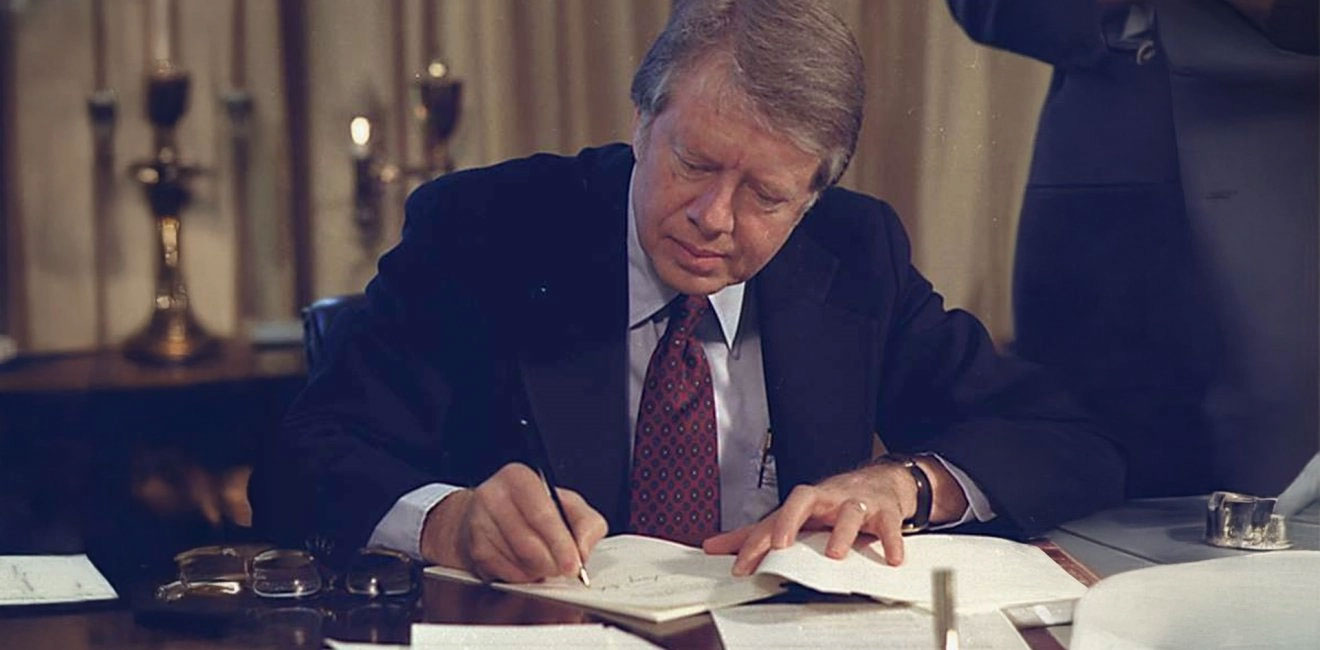
(RNS) — Framed on a wall in my office is a copy of the Refugee Act, bearing the signature of President Jimmy Carter. As the world mourns his death and reflects upon his life, among his greatest legacies are the more than 3.5 million refugees who have rebuilt their lives in the United States under the legal authority of the Refugee Act.
When President Carter signed that bill in 1980, standing with the world’s persecuted was not a Republican or Democratic value. It was simply an American commitment, so much so that it unanimously passed the U.S. Senate.
The Refugee Act formalized a unique public-private process to resettle individuals who face a credible fear of persecution in their countries of origin for reasons of their religion, race, political opinion or other specific grounds. World Relief, the global Christian humanitarian organization where I lead all U.S. programs, is among the 10 current voluntary agencies the law commissions to help refugees become fully integrated, economically self-sufficient Americans.
The Refugee Act also gave the president the authority to set an annual ceiling on refugee admission. Facing the ongoing exodus of refugees from Southeast Asia after the fall of Saigon, President Carter set the first ceiling at 231,700 and admitted 207,000 in 1980, more than any single year since.
By comparison, President Joe Biden has set the refugee ceiling at 125,000 each year since 2022. While high by recent standards, that’s far from the resettlement levels of 1980, even as the number of refugees globally has more than quadrupled.
There is also more to resettling refugees than just an annual presidential determination. Last year, the U.S. actually resettled about 100,000 refugees. In 2023 and 2022, respectively, the Biden administration resettled approximately 60,000 and 25,000 of the 125,000 maximum.
As we begin 2025, the future of resettlement is tenuous. President-elect Donald Trump, who lowered but never fully zeroed out the resettlement program in his first term, has pledged to suspend refugee admissions “on Day 1.” It’s unclear if that will be an indefinite suspension or if, after a temporary suspension similar to what he ordered in 2017, President-elect Trump will recognize that refugees blessed to experience America’s religious and economic freedoms are precisely the legal immigrants who “come in with love for the country” whom he has praised.
I hope the president-elect and both Republicans and Democrats in Congress will recommit themselves to President Carter’s signature program, which has been a stunning success both in keeping our nation safe and our economy resilient.
Refugees resettled to the U.S. “undergo more vetting than any other immigrants to the U.S,” according to the assessment of the Heritage Foundation. The annual odds of an American being killed in a terrorist attack perpetrated by a refugee are 1 in 3.3 billion.
On an economic level, the resettlement program has been a boon. Twenty years after arrival, the average refugee adult has contributed approximately $21,000 more in taxes than the combined cost of governmental expenditures on their behalf. And their contributions as employment-authorized workers, consumers and entrepreneurs are fueling economic growth overall, particularly as our nation faces labor shortages that could revive inflation.
But the most important reasons I believe in refugee resettlement are moral. In reflecting on the history of the Refugee Act in 2021, President Carter emphasized the religious faith that motivated him and that motivates many Americans to welcome refugees. “Americans know the heart of the stranger,” he said, echoing sentiments from the Book of Exodus, when God commanded the Israelites to welcome strangers precisely because they themselves had been strangers in a foreign land.
World Relief was founded by the National Association of Evangelicals, and 80 years later, we still see firsthand many evangelicals deeply committed to standing with refugees. A recent study by Lifeway Research found that 71% of evangelicals believe the U.S. has a moral responsibility to accept refugees, and more than one-third have personally been involved in refugee or immigrant ministry.
As we celebrate the legacy of President Carter, my prayer is that all Americans — and particularly those who share President Carter’s evangelical Christian faith — will recommit ourselves to standing with those forced to flee persecution.
And as for President Carter, I believe he is being welcomed into eternity in precisely the way Jesus said those who welcome strangers would be: “Come, you who are blessed by my Father; take your inheritance, the kingdom prepared for you since the creation of the world. For I was hungry and you gave me something to eat, I was thirsty and you gave me something to drink, I was a stranger and you invited me in … [for] whatever you did for one of the least of these brothers and sisters of mine, you did for me.”
(Aerlande Wontamo is the senior vice president of U.S. programs for World Relief. The views expressed in this commentary do not necessarily reflect those of RNS.)
